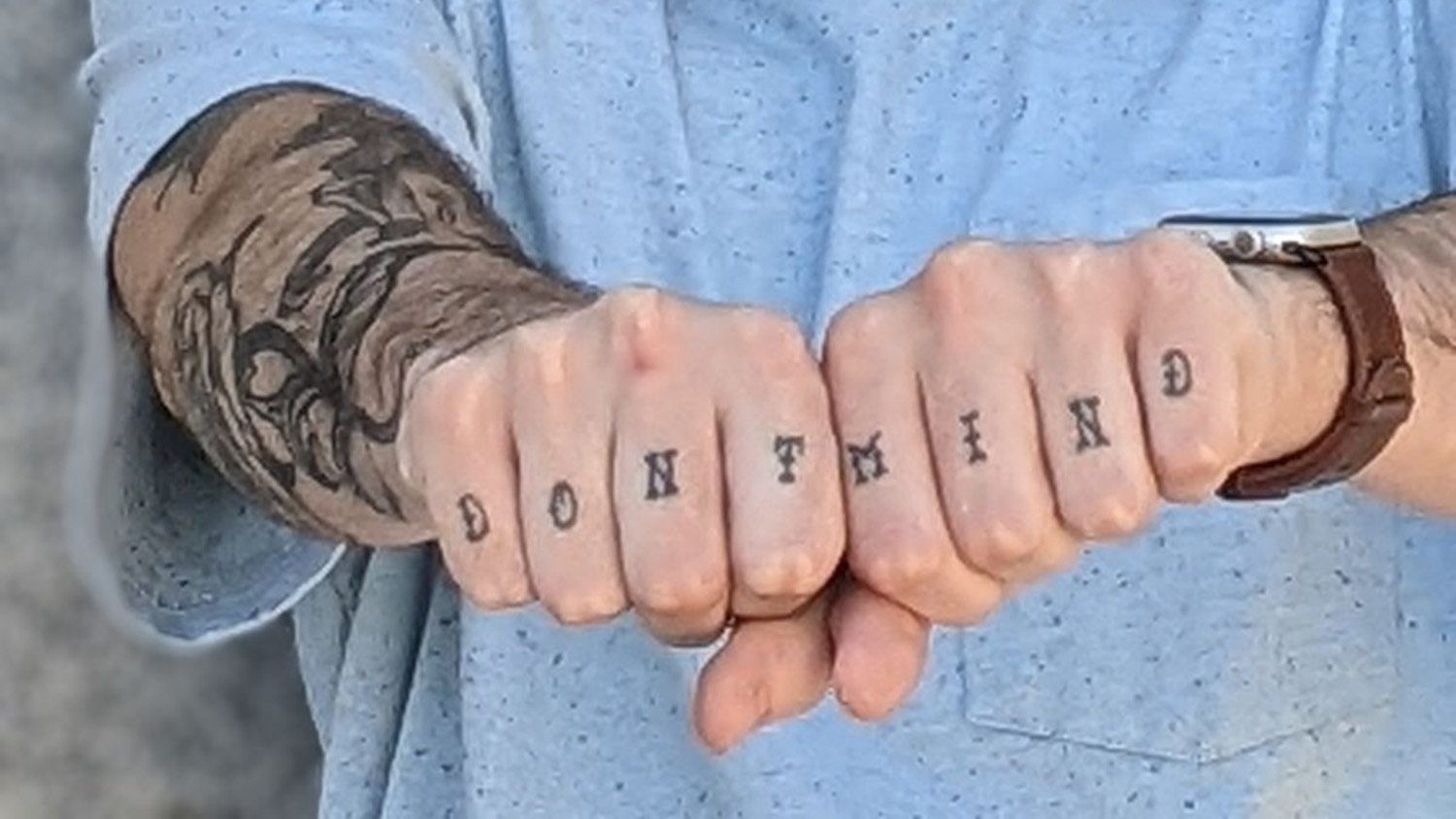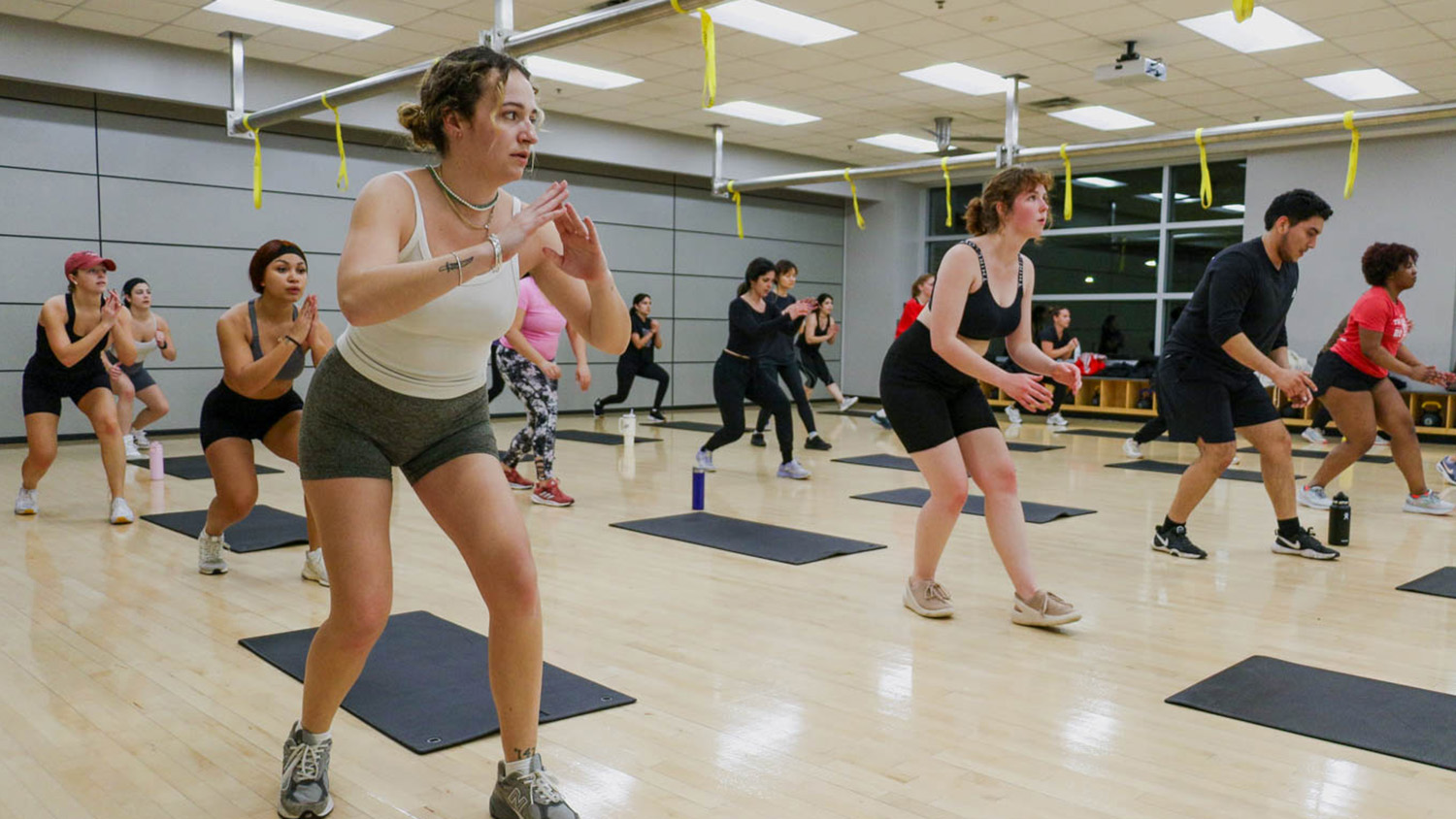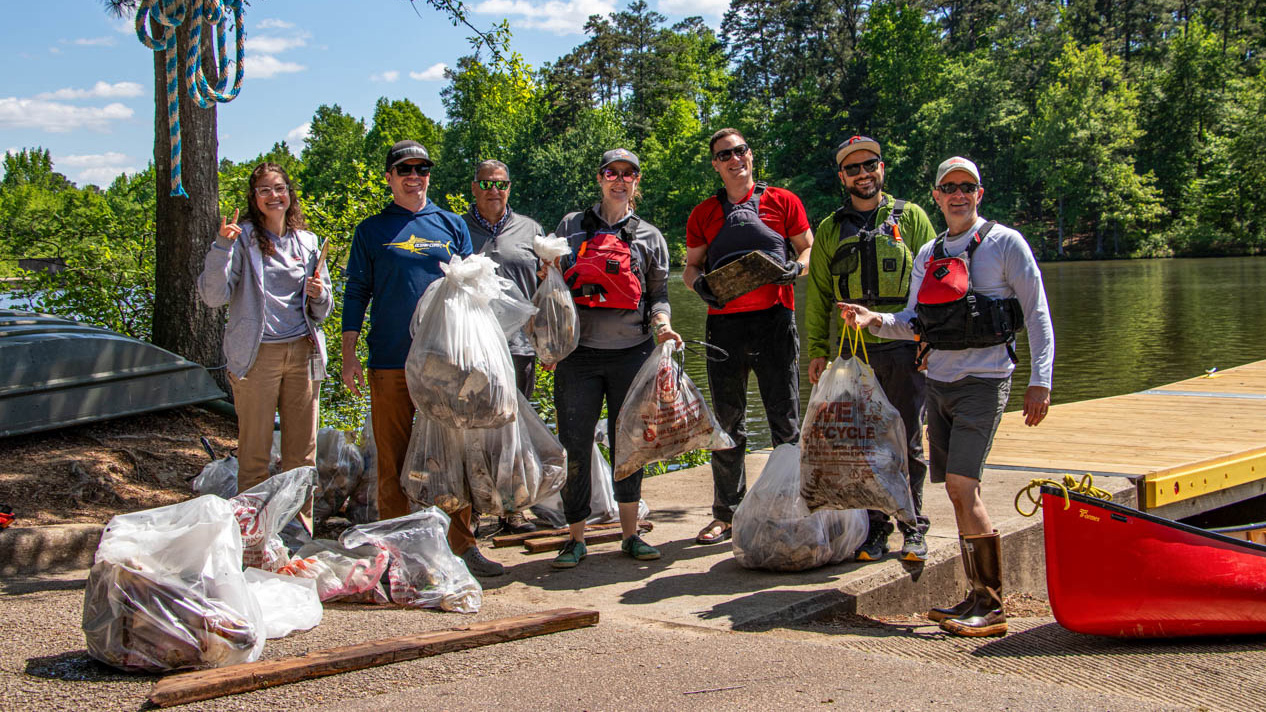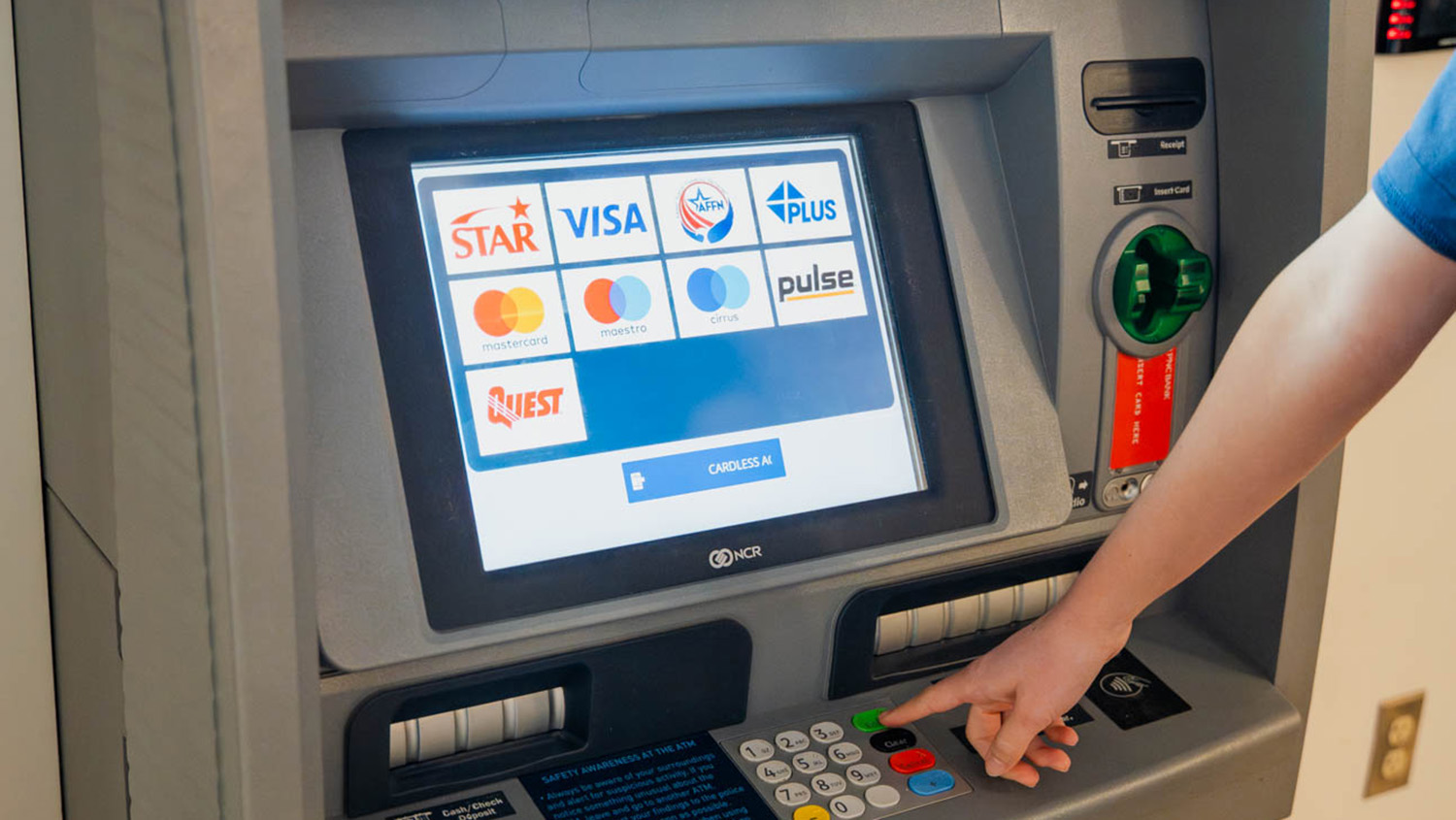‘Don’t Mind:’ NC State Alum Dylan Ebbs Shares Lessons from Mental Health Journey

Please be advised that this story contains mentions of mental health struggles and suicide. If you need help, please visit NC State’s Wolfpack Wellness page. To speak with a crisis counselor, call 919.515.2423 or dial 988 to reach the Suicide & Crisis Lifeline.
The knuckles on each of NC State alum Dylan Ebbs’ fingers are tattooed with a different letter. A quick glance across his extended fists, placed together, shows that they spell out the phrase “don’t mind.”
A curious person meeting Ebbs might ask what the tattooed phrase refers to – and that’s exactly what Ebbs wants. They symbolize the ongoing mental health journey he’s been on for the past several years, and the place he’s arrived where he’s open and willing to talk about it.
“It’s all mental health,” Ebbs said. “It stands for ‘I don’t mind talking about it.’ That’s how I think about it. The hand tattoos weren’t supposed to be gaudy or anything like that. They served the purpose that I wanted them to serve, which is a conversation starter.”
They served the purpose that I wanted them to serve, which is a conversation starter.
Ebbs spent two years at NC State out of high school before transferring to UNC-Wilmington and graduating with a degree in film studies in 2014.
Ebbs said he feels he’s been battling some form of depression for most of his life, but a panic attack shortly before Christmas in 2018 started a journey of mental health challenges for him.
“Since that Christmas, my life took a drastic turn and I haven’t come back yet,” Ebbs said.
While Ebbs stated that his journey with mental health is ongoing, he said he’s in a much better place today.
Ebbs said that finding ways to communicate with his loved ones and the people in his life about what he’s going through has helped him through his battle with depression.
“I’ve found that communicating has made a world of difference for everybody around me,” Ebbs said. “I considered suicide, I was very close. Since that point, it’s just become very apparent that I need to be receptive to people’s concerns around me. And I also need to be receptive to others’ concerns, a fellow person that’s struggling with depression or mental health. Communication is the key.”
Ebbs knows that finding that ability to communicate helped save his life.
When he contemplated taking his life in December 2019, he called his brother and asked him to come stay with him, because he didn’t feel safe alone.
“I wouldn’t be where I am today if I hadn’t kept communicating,” Ebbs said. “Had I not started the steps to become a communicator, I don’t know what would have happened. It was rough. But just being in the trenches made me realize that if I’m here and I need help, I’m sure somebody else is too.”
I wouldn’t be where I am today if I hadn’t kept communicating.
The medium that Ebbs has found most effective for communicating with his friends and family about his journey, what he’s going through and what he’s feeling, is through writing.
Ebbs has compiled a chronological set of poems and corresponding journal entries that describe different moments and episodes in his mental health journey to help his loved ones understand.
“My journal entries are raw, unedited, when I felt what I was feeling at the time, when I said what I said at the time in whatever journal it is,” Ebbs said. “That’s the one to one. I needed to be able to communicate as best I can to the folks around me that care about me about what I’m going through. That’s what this turned into.”
Together
Dylan Ebbs, writing to his parents about his mental health journey
We were left unprepared
With every reason to be scared
The path before us haunting
The journey looks daunting
I shudder with fear
I didn’t ask to be here
How far will we have to go?
You whisper it’s okay to not know
You gently grab my hand
You say I’ll carry you if you can’t stand
There is no price I will not pay
To accompany you on your way
I will not leave your side
One by one we’ll take each stride
Together we’ll carry this burden
Together we’ll close the curtain
The poems in particular have served as a creative outlet that has allowed Ebbs to articulate his feelings.
“Poems can be emotional,” Ebbs said. “I’m not a writer by any means, but in the past, creative writing has always been a good outlet for me. And so the poems were just something that came to me. I didn’t plan on writing a bunch of poems, I just ended up doing it.”
Mental health does not define me
Dylan Ebbs
I am not alone on this great odyssey
There is no mountain I cannot ascend
There is no wound I cannot mend
One day my hour will arrive
And I’ll shout from that mountain I have survived
Ebbs said that, at the start of his journey, when he first began writing his journal entries and poems, the purpose was solely to help him navigate his own mental health challenges and communicate with his friends and family.
Later on, however, he came to feel that his own realizations and story might help others navigate similar situations. After hearing of the tragic student deaths by suicide at NC State during the 2022-23 school year, Ebbs felt compelled to share his story with the university community.
“As I’ve matured, it has become more apparent the more people I’ve talked to that it’s important,” Ebbs said. “I have to make the first move to help someone feel comfortable telling me about their mental health struggles. I’m not going to judge you. As I’ve matured with my mental health, the need and the want to extend that help beyond just me has grown as well.”
I have to make the first move to help someone feel comfortable telling me about their mental health struggles.
There are a few lessons Ebbs wants others navigating mental health struggles to take from his own story and journey.
One of those is that there is no shame in asking for help, a lesson Ebbs said he himself had to learn.
“It took me a while to come to grips with the fact that I was actually struggling,” Ebbs said. “For a long time, I thought I was above help. I felt like I was losing if I sought help. I was a failure if I went and asked somebody for help. But I didn’t really have a choice. Help had to happen, so it did.”
Ebbs said that, from that realization that help is needed, communication with loved ones about what someone is going through is another key component.
“It’s a big deal,” Ebbs said. “Ideally you would have people around you that you would be able to reach out to, and they would be judgment free. Once you get there and cross that line, it’s a domino effect. But it definitely starts with just acknowledging that you’re not OK, and that it’s OK to not be OK.”
Ebbs hopes to continue to be able to help others by sharing his own experiences, along with his journal entries and poems.
And, of course, he always has his “don’t mind” tattoos, ready to start the conversation.
“Just by mentioning that, I’ve had people open up to me about their own mental health journey,” Ebbs said. “Even if it’s very surface level, it’s still a conversation that they may not have had.”
- Categories:


